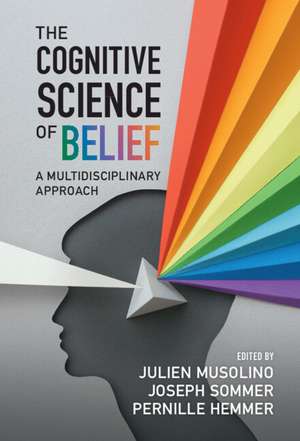The Cognitive Science of Belief: A Multidisciplinary Approach
Editat de Julien Musolino, Joseph Sommer, Pernille Hemmeren Limba Engleză Paperback – 16 noi 2022
| Toate formatele și edițiile | Preț | Express |
|---|---|---|
| Paperback (1) | 353.83 lei 6-8 săpt. | |
| Cambridge University Press – 16 noi 2022 | 353.83 lei 6-8 săpt. | |
| Hardback (1) | 850.16 lei 6-8 săpt. | |
| Cambridge University Press – 16 noi 2022 | 850.16 lei 6-8 săpt. |
Preț: 353.83 lei
Nou
Puncte Express: 531
Preț estimativ în valută:
67.71€ • 70.87$ • 56.35£
67.71€ • 70.87$ • 56.35£
Carte tipărită la comandă
Livrare economică 31 martie-14 aprilie
Preluare comenzi: 021 569.72.76
Specificații
ISBN-13: 9781009009850
ISBN-10: 1009009850
Pagini: 584
Dimensiuni: 152 x 229 x 32 mm
Greutate: 0.83 kg
Ediția:Nouă
Editura: Cambridge University Press
Colecția Cambridge University Press
Locul publicării:New York, United States
ISBN-10: 1009009850
Pagini: 584
Dimensiuni: 152 x 229 x 32 mm
Greutate: 0.83 kg
Ediția:Nouă
Editura: Cambridge University Press
Colecția Cambridge University Press
Locul publicării:New York, United States
Cuprins
Introduction Joseph Sommer, Julien Musolino and Pernille Hemmer; Part I. Understanding Belief: 1. The cognitive science of 'belief' (the word) Ray Jackendoff; 2. The science of belief: a progress report Nicolas Porot and Eric Mandelbaum; 3. The role of context in belief evaluation: costs and benefits of irrational beliefs Elly Vintiadis and Lisa Bortolotti; 4. How and why does schematic knowledge affect memory? Qiong Zhang; 5. Probability, belief, and the richness of cognition Steve Piantadosi; 6. Intuitive and reflective beliefs Dan Sperber; 7. Intuitive and reflective beliefs in a modern world Bastien Trémolière and Florence Lespiau; 8. Do cultural misbeliefs cause costly behavior? Hugo Mercier and Sacha Altay; 9. Cultural evolutionary psychology of belief Theiss Bendixen and Benjamin Grant Purzycki; Part II. Domains of Beliefs: 10. Religious beliefs Pascal Boyer; 11. Essentialist views of criminal behavior predict increased punitiveness Justin W. Martin, Sophie Charles, and Larisa Heiphetz; 12. Political belief formation: Individual differences and situational factors Lala Muradova and Kevin Arceneaux; 13: Americans' lack of political beliefs and the consequences for democracy Yalidy Matos and Katherine McCabe; 14. Thoughts and players: an introduction to old and new economic perspectives on beliefs Andras Molnar and George Loewenstein; 15. How intuitive beliefs inoculate us against scientific ones Andrew Shtulman; 16: COVID-19: conspiracies and collateral damage vs. constructive critique Stephan Lewandowsky, Konstantinos Armaos, Hendrik Bruns, Philipp Schmid, Dawn Liu Holford, Ulrike Hahn, Ahmed Al-Rawi, Sunita Sah, John Cook, Marie Juanchich and James Ladyman; 17. Believing in race vs. knowing ourselves Guy Harrison; Part III. Variation in Beliefs: 18. Delusions Philip R. Corlett; 19: delusions and beliefs as a symptom of illness Eisuke Sakakibara; 20. The elusive search for individual differences in myside thinking Keith E. Stanovich and Maggie E. Toplak; 21. Modeling individual differences in beliefs and opinions using thurstonian models Michael Lee and Michelle Y. Ke; 22. Belief in human rights: an opportunity for cross-cultural cognitive science Jordan Kiper; 23. The belief-action gap in environmental psychology: How wide? How irrational? Aurore Grandin, Mélusine Boon-Falleur and Coralie Chevallier; 24. Training can improve decision making Irene Scopelliti; 25. Building better beliefs through actively open-minded thinking Emlen Metz.
Notă biografică
Rutgers University, New Jersey
Descriere
An integrative exploration of the concept of beliefs and their applications as studied across the cognitive sciences.
